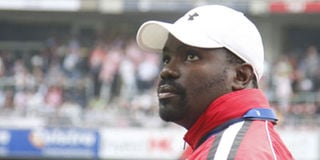The men who came and went before Friday

Former Kenya Sevens coach Benjamin Ayimba.
What you need to know:
- Gordon Anampiu ( 2005-2006): Was elected after winning the national sevens circuit with Harlequins. Together with legendary Edward Rombo, the duo alternated in travelling with the team for eight IRB legs, including the 2006 Commonwealth Games in Melbourne.
It has taken many coaches to get Kenya Sevens where it is now. Below are the men behind the successive teams that have captured the imagination of the world before Mike Friday’s time.
Tom Oketch (1986-1992): He was made Kenya’s first sevens national team coach after successfully guiding Watembezi RFC to glory in the Middle East. Oketch took the sevens team to Hong Kong in 1987 and for the inaugural 1992 Sevens World Cup preliminaries in Italy.
He is best remembered by his players for making them super fit and for carefully selecting working combinations. Known for his reverse psychology, he famously told Jimmy Owino in Bulawayo: “I’m only selecting you because you are big.” Jimmy “Green” had a huge game that day against Matebeleland.
Ham Onsando (1996-1997): He coached the side to its first ever Safari Sevens win in 1997 but was sacked two days later. When assessing the team’s capabilities, he noticed that the most talented players could attack well and defend averagely. He focused on scoring. “In rugby, all you have to do is score more than the other team.”
Michael ‘Tank’ Otieno (1998-2000): He kept the 1997 momentum and reached the semi-finals of the Middlesex Sevens in London. He was the man in charge in a difficult Commonwealth Games competition in Kuala Lampur in 1998.
“The players were very talented and matched the best in the world. Our technical abilities were lagging, and it was an experience to play at that stage,” recalls Otieno, who is now the Technical manager of the KRU.
Bill Githinji- (2001-2005): The successful Impala coach, immediately brought new blood into the side after Otieno’s resignation. He took the team to the 2001 Sevens World Cup in Mar Del Plata, Argentina, and the 2005 Sevens World Cup in Hong Kong. It was during his time that Kenya achieved core world series status.
Gordon Anampiu ( 2005-2006): Was elected after winning the national sevens circuit with Harlequins. Together with legendary Edward Rombo, the duo alternated in travelling with the team for eight IRB legs, including the 2006 Commonwealth Games in Melbourne.
During their time, they identified Benjamin Ayimba, Oscar Osir and Felix Ochieng to take over the side as senior players. Anampiu was the only coach to create a succession plan.
Benjamin Ayimba (2006-2011): After playing professional rugby in the UK and for the national sevens team, Ayimba was identified, along with Osir and Ochieng, as the senior players to take over training the side.
“Our schedule was full, and we had day jobs. The three of us decided to coach the side when Rombo and Anampiu had their hands full,” Ayimba says. Ayimba and Osir eventually stopped playing competitively to take over their new administrative roles.
It was under Ayimba and Osir that the side reached the semi-finals of the 2009 World Cup in Dubai, beating Fiji 26-7 in the quarter finals. That was the first time for Kenya to defeat the fabled sevens masters.
In the same year the side also made it to the final of the Adelaide World Series leg where they lost 26-7 to South Africa. In the 2008/2009 season, Kenya finished a heady sixth in the world after accumulating 64 points.
Mitch Ocholla (2011-2012): His tenure was troubled and with the imminent threat of losing the World Series core status, the KRU moved to bring in foreign coaches to preserve the coveted recognition.
Kenya dropped to 12th position overall with 40 points. “We had a great side, but we couldn’t focus fully”, recalls Ocholla. Payment issues meant some players, although earning a salary from the union, had to look elsewhere to make ends meet.”




